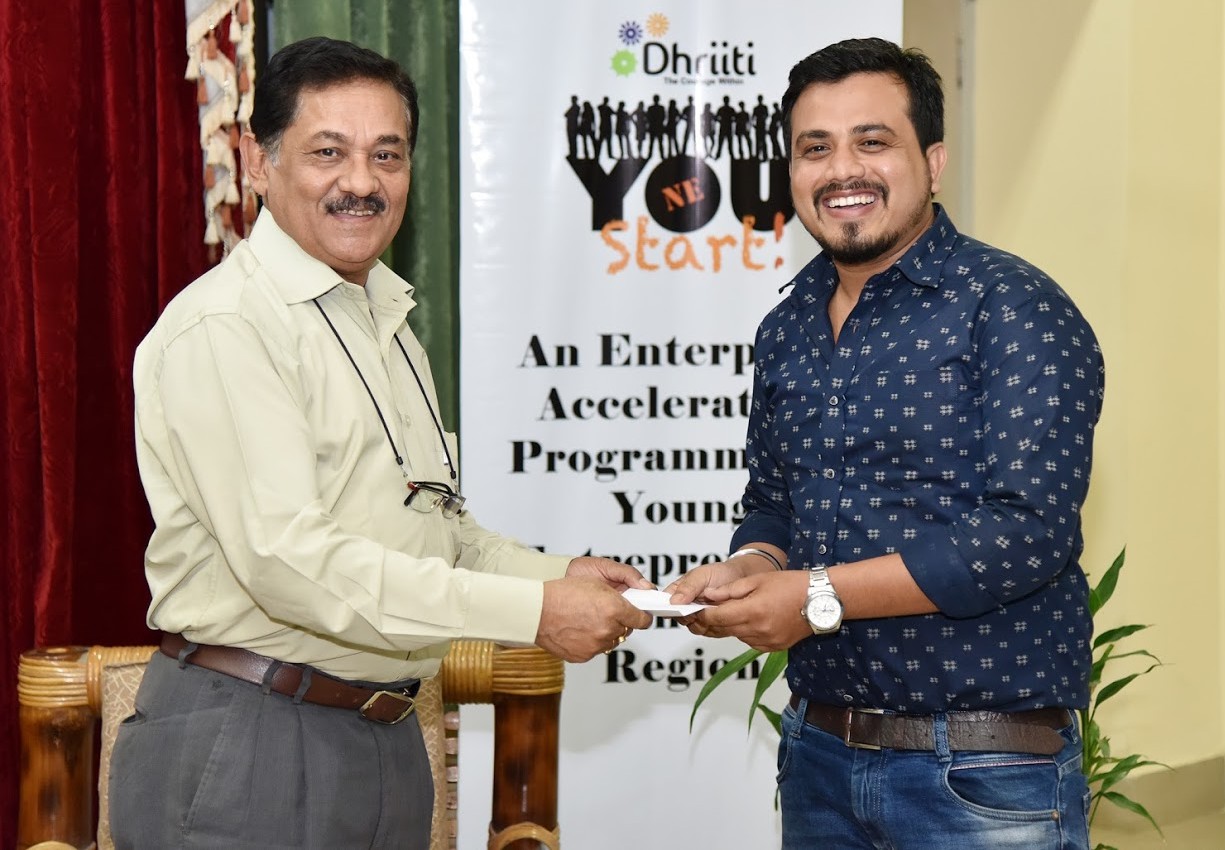
Dhriiti You Start! NE – Entrepreneur Awards 2018
YOU Start! NE – Enterprise Acceleration Programme for Youth Entrepreneurs – is an initiative dedicated to promoting youth entrepreneurship in North East India. After receiving approximately 100 application from states covering Assam, Meghalaya, Mizoram, Nagaland, Tripura and Manipur, we shortlisted and trained 52 young entrepreneurs from this region in 3 different cities i.e. Shillong, Guwahati and Dimapur. This was followed by mentoring support to each of the trained entrepreneur to enable them to develop robust enterprise plans, providing them with a solid foundation to sustain and grow their enterprises. 11 entrepreneurs were selected after the Ist round of Business Plan competition. This was followed by 12 weeks of mentoring support to accelerate their businesses. We are gearing up for the final event where 8 young entrepreneurs will be competing. The competition will be two segments one which is online voting and second is business pitches.
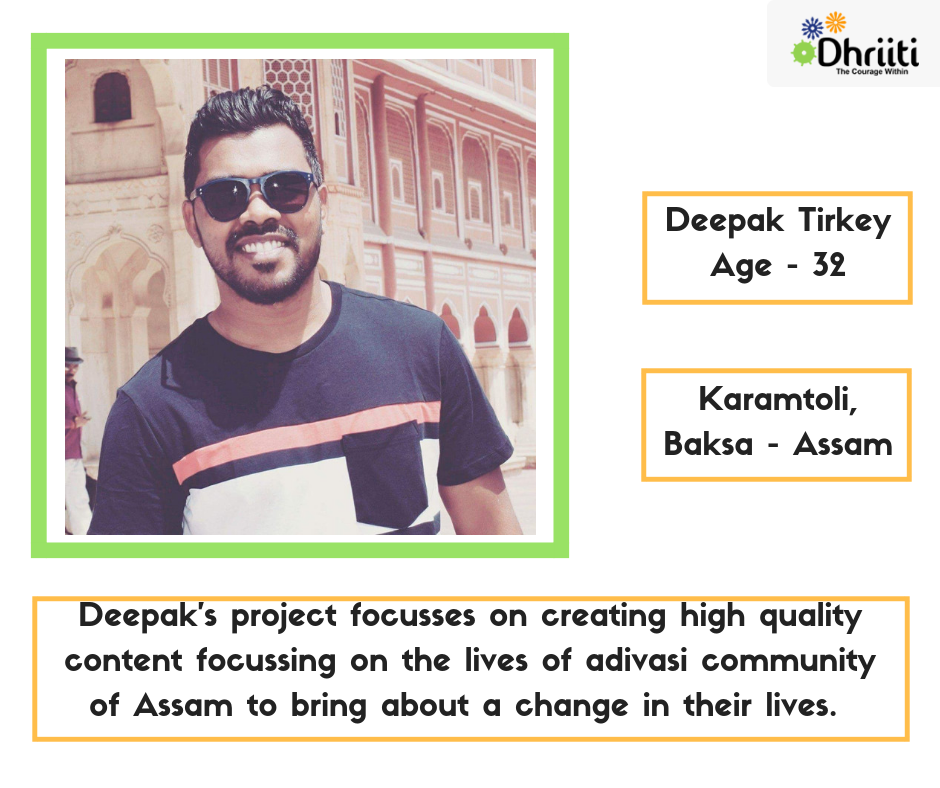 Deepak comes from the adivasi community of a small village of Baksa district of Assam. He completed his graduation from St. Anthony’s College, Shillong in Mass Communication and Video Production. He worked for 6 years in NDTV as an associate producer. But he longed to return back to his home and produced short films in Sadri language (native) portraying the stories of this region. In this process, he started his venture Westudios, an animation and video production company that aims to create quality content focusing on the Adivasi community of Assam. The basic idea is to create and produce audio-visual regional content in the realms of the performing arts, new media art, film, television, video, animation, design, etc.
Deepak comes from the adivasi community of a small village of Baksa district of Assam. He completed his graduation from St. Anthony’s College, Shillong in Mass Communication and Video Production. He worked for 6 years in NDTV as an associate producer. But he longed to return back to his home and produced short films in Sadri language (native) portraying the stories of this region. In this process, he started his venture Westudios, an animation and video production company that aims to create quality content focusing on the Adivasi community of Assam. The basic idea is to create and produce audio-visual regional content in the realms of the performing arts, new media art, film, television, video, animation, design, etc.
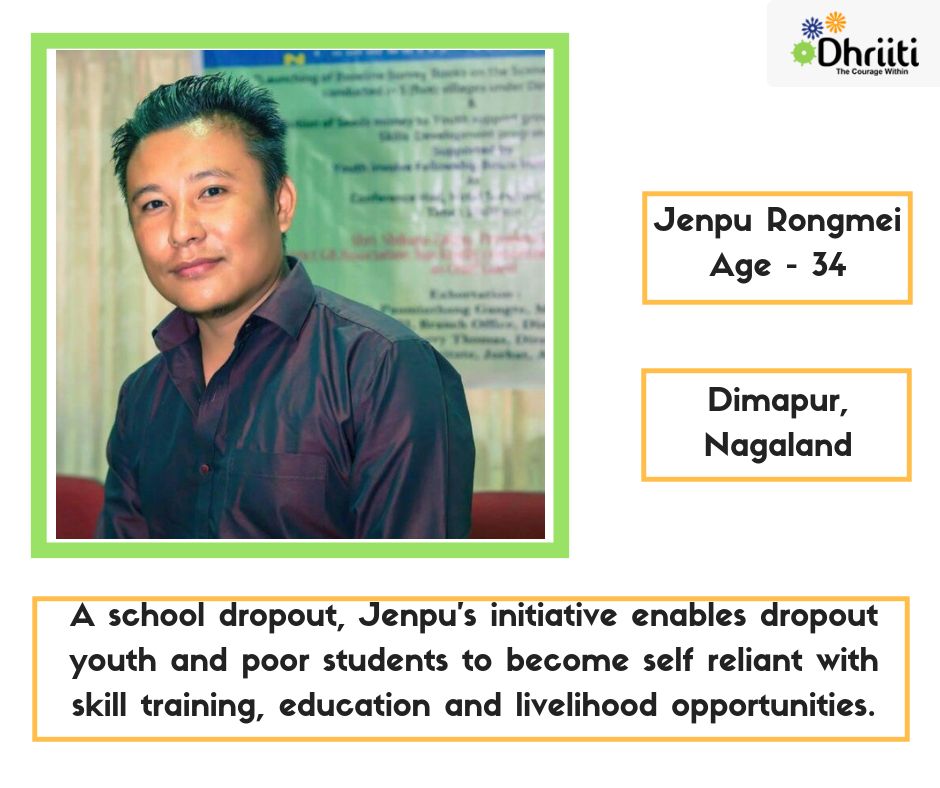 Jenpu is from Dimapur, Nagaland. Growing up, Jenpu has witnessed many hardships, which led him to the idea of ‘CAN Youth’. He believes it is his social responsibility to work with the youth and children living with difficult circumstances. CAN Youth was established in 2012 with the sole aim to support the inopportune dropout youth and students from below poverty line (BPL) in Dimapur district of Nagaland. The organization is currently focusing on establishing Information and Resource Centre to provide services on education, skill, job opportunity, and entrepreneurship through various avenue and linkages for sustainability development.
Jenpu is from Dimapur, Nagaland. Growing up, Jenpu has witnessed many hardships, which led him to the idea of ‘CAN Youth’. He believes it is his social responsibility to work with the youth and children living with difficult circumstances. CAN Youth was established in 2012 with the sole aim to support the inopportune dropout youth and students from below poverty line (BPL) in Dimapur district of Nagaland. The organization is currently focusing on establishing Information and Resource Centre to provide services on education, skill, job opportunity, and entrepreneurship through various avenue and linkages for sustainability development.
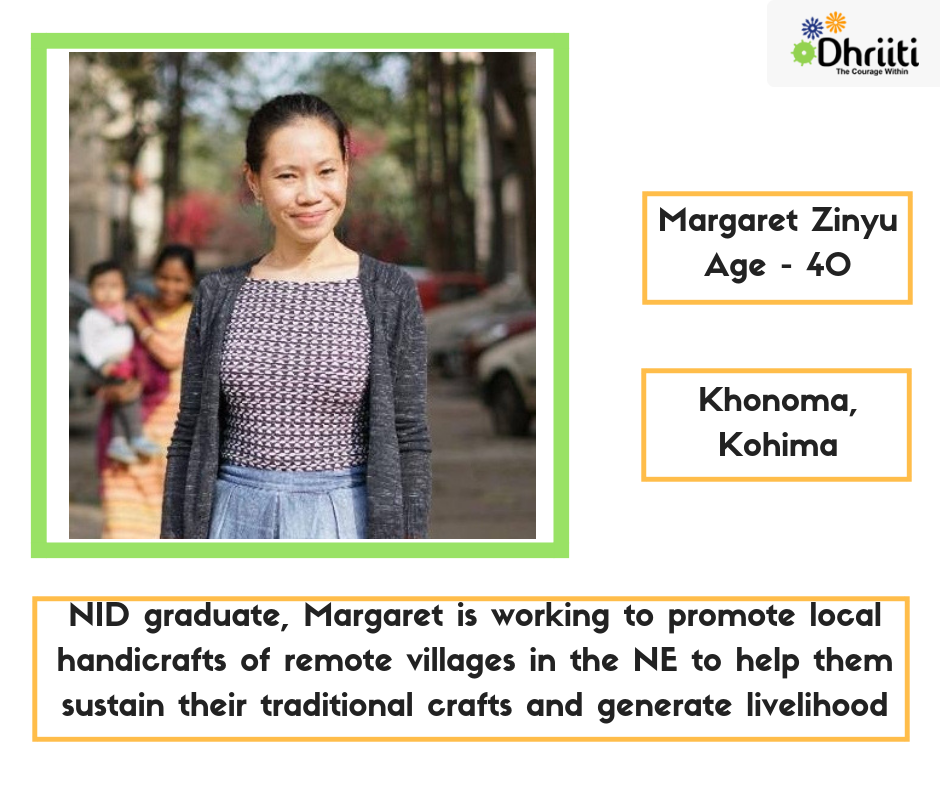 A NID Ahmedabad graduate, Margaret was always passionate about textiles. After working in the corporate sector of design for 8 years, she headed back home and decided to work in the craft industry. She set up Studio Predilection in 2015 with a belief that crafts is the second largest source of income for rural people in North East India and sustaining these skills as livelihood will create more employment generation. That way the indigenous traditions of Naga Crafts will also thrive for a better future. ‘Woven Threads’ is the label under Studio Predilection, which sells Handcrafted artisanal, contemporary, finesse, stylish and comfortable home furnishing products.
A NID Ahmedabad graduate, Margaret was always passionate about textiles. After working in the corporate sector of design for 8 years, she headed back home and decided to work in the craft industry. She set up Studio Predilection in 2015 with a belief that crafts is the second largest source of income for rural people in North East India and sustaining these skills as livelihood will create more employment generation. That way the indigenous traditions of Naga Crafts will also thrive for a better future. ‘Woven Threads’ is the label under Studio Predilection, which sells Handcrafted artisanal, contemporary, finesse, stylish and comfortable home furnishing products.
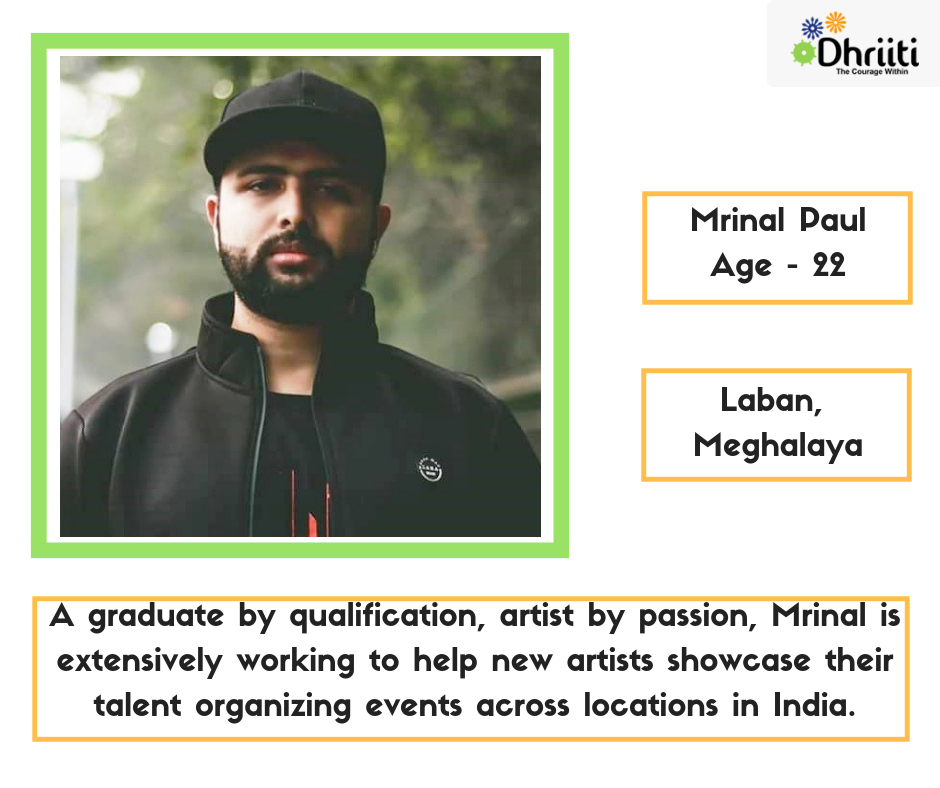 Mrinal, a graduate from Laban, Shillong, Meghalaya is an artist at heart and understands thoroughly the challenges that artists face. This led him to create an artists’ collective in 2016, which today has expanded into a talent and event management entity called MOX. The talent management agency is working with talents across the North Eastern region. MOX explores talents, builds their presence digitally, and curates LIVE opportunities for them to showcase their skills. The agency aims to showcase its artists across India and South-East Asia by next year.
Mrinal, a graduate from Laban, Shillong, Meghalaya is an artist at heart and understands thoroughly the challenges that artists face. This led him to create an artists’ collective in 2016, which today has expanded into a talent and event management entity called MOX. The talent management agency is working with talents across the North Eastern region. MOX explores talents, builds their presence digitally, and curates LIVE opportunities for them to showcase their skills. The agency aims to showcase its artists across India and South-East Asia by next year.
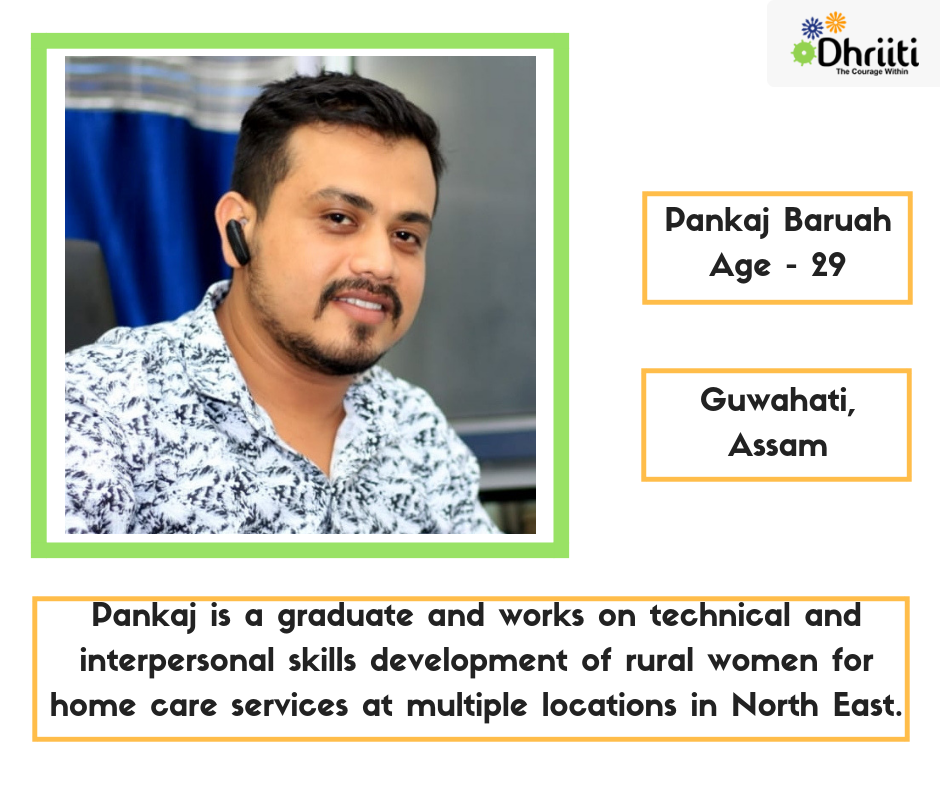 Pankaj is the Director of Maitri, a domestic service placement and management company which recruits, trains, and secures employment for women from underprivileged Northeast communities. “Sahayika” (caregiver in Hindi), the flagship program of Maitri is an initiative designed to build both the technical and interpersonal skills needed by domestic workers. The company also verifies that the prospective employer’s household does not have a history of issues with domestic service workers, sets clear expectations for the nature of work, and briefs the family on the prospective Sahayika’s background, skills, and employment preferences. Furthermore, Maitri takes this time to educate each Sahayika on her employee rights including a regular salary, paid leave, a bank account, and other benefits enjoyed by her service sector counterparts.
Pankaj is the Director of Maitri, a domestic service placement and management company which recruits, trains, and secures employment for women from underprivileged Northeast communities. “Sahayika” (caregiver in Hindi), the flagship program of Maitri is an initiative designed to build both the technical and interpersonal skills needed by domestic workers. The company also verifies that the prospective employer’s household does not have a history of issues with domestic service workers, sets clear expectations for the nature of work, and briefs the family on the prospective Sahayika’s background, skills, and employment preferences. Furthermore, Maitri takes this time to educate each Sahayika on her employee rights including a regular salary, paid leave, a bank account, and other benefits enjoyed by her service sector counterparts.
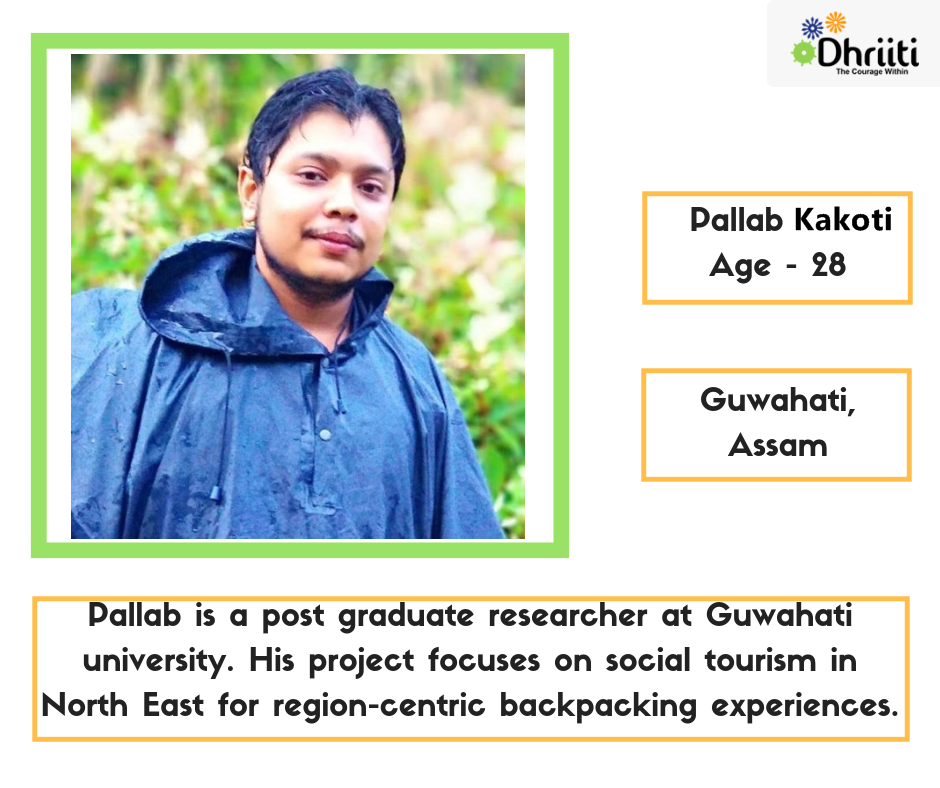 Pallab is a Post Graduate Researcher at Guwahati University. During the study of human capabilities, he realized that life is a constant pursuit of happiness. Some transcend to higher levels and associate their happiness with others. It was during a travel with his friends from abroad, who made him realize the potentiality of this region in terms of nature, resources available and the distinct yet varied culture. In 2017, he formed Eastern Wave, a community-powered tourism showcasing the culture and nature of Northeast India. Soon Pallab and his team started organizing camping trips and mainly catered to international backpackers as the company exactly offered the kind of experience these backpackers desire. Eastern Wave focusses on community-powered Tourism showcasing the Culture and Nature of Northeast India.
Pallab is a Post Graduate Researcher at Guwahati University. During the study of human capabilities, he realized that life is a constant pursuit of happiness. Some transcend to higher levels and associate their happiness with others. It was during a travel with his friends from abroad, who made him realize the potentiality of this region in terms of nature, resources available and the distinct yet varied culture. In 2017, he formed Eastern Wave, a community-powered tourism showcasing the culture and nature of Northeast India. Soon Pallab and his team started organizing camping trips and mainly catered to international backpackers as the company exactly offered the kind of experience these backpackers desire. Eastern Wave focusses on community-powered Tourism showcasing the Culture and Nature of Northeast India.
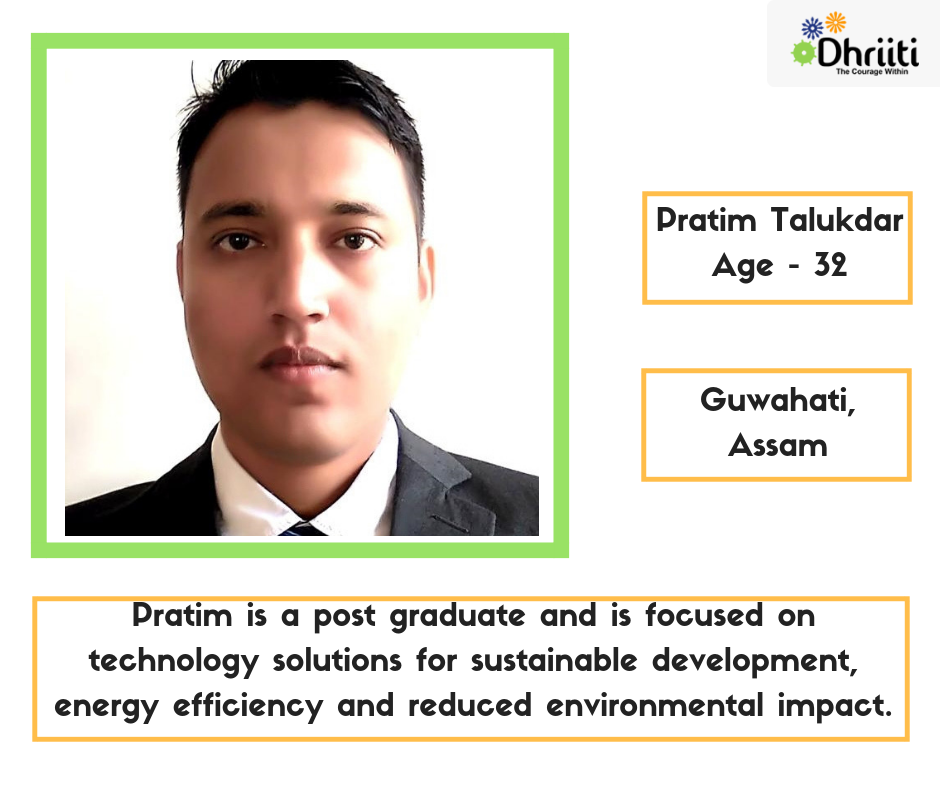 An engineering graduate, Pratim has worked in the power industry for more than 7 years. He was actively associated with the technical and commercial aspects of the power industry. During his job stint, he realized the gap in the market and started working for the possible solutions to address those gaps. In 2016, he decided to become a full-fledged entrepreneur and founded Zinzid Technologies, which works with a vision to create technology solutions for sustainable development, primarily focusing on the energy efficiency of the customers and to reduce their environmental footprints. The company provides economic benefits to the customers, besides supporting the larger environmental goals.
An engineering graduate, Pratim has worked in the power industry for more than 7 years. He was actively associated with the technical and commercial aspects of the power industry. During his job stint, he realized the gap in the market and started working for the possible solutions to address those gaps. In 2016, he decided to become a full-fledged entrepreneur and founded Zinzid Technologies, which works with a vision to create technology solutions for sustainable development, primarily focusing on the energy efficiency of the customers and to reduce their environmental footprints. The company provides economic benefits to the customers, besides supporting the larger environmental goals.
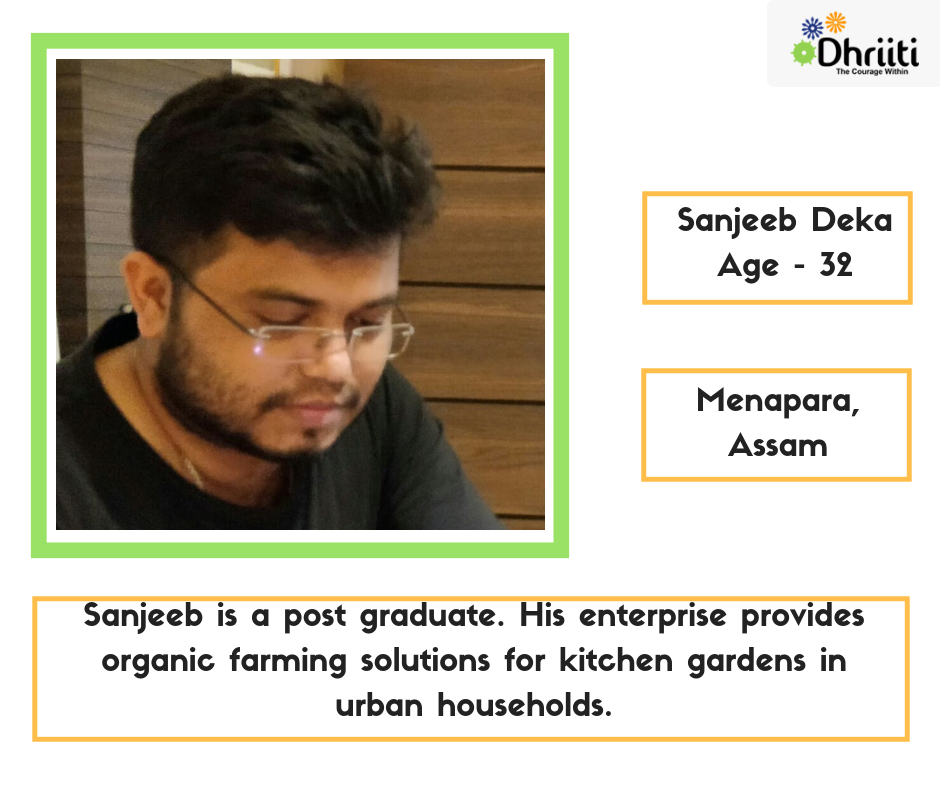 Sanjeeb comes from Menapara village of Daring district in Assam. After one of his family relatives achieved good health by using organic vegetables; he realized that organic vegetables have better nutritional value, improves health and also promoted to environmental sustainability. While working with Diya Foundation, Sanjeeb got an opportunity to practice organic farming in kitchen gardens in villages. He realized that urban households today are more inclined towards fresh organic fruits and vegetables. This idea gave birth to his venture, O-Kheti that presently sells a package of products and the services. The process is cost-effective and low-maintenance. Moreover one is aware that the best quality vegetables are being consumed by the family.
Sanjeeb comes from Menapara village of Daring district in Assam. After one of his family relatives achieved good health by using organic vegetables; he realized that organic vegetables have better nutritional value, improves health and also promoted to environmental sustainability. While working with Diya Foundation, Sanjeeb got an opportunity to practice organic farming in kitchen gardens in villages. He realized that urban households today are more inclined towards fresh organic fruits and vegetables. This idea gave birth to his venture, O-Kheti that presently sells a package of products and the services. The process is cost-effective and low-maintenance. Moreover one is aware that the best quality vegetables are being consumed by the family.

Plastic ban: An opportunity to encourage ecological and economic growth
The need of eco-friendly products has never been so important than today when plastic has already choked our cities, oceans, and mountains. This year on World Environment Day, the entire world took a pledge to ‘Beat Plastic Pollution’ to combat one of the great environmental challenges that our generation is facing. Continuing the resolution, Maharashtra, and Uttar Pradesh states banned the use of plastics in July while Odisha government has planned to implement the rule from October month. This comprehensive plastic ban also includes disposable cups and plates, cutlery, and packaging. Hence, the products made of natural resources like leaf, coconut, and wood have caught the attention of everyone these days.
Plastic waste has become a major concern in urban areas and people now are looking for options to replace the plastic cutlery with recyclable products. This rising demand of eco-friendly products has created entrepreneurship opportunities for people in rural and semi-urban areas. To boost small enterprises, many corporates and NGOs are also providing technology and skill development programs that help people in their entrepreneurial journey and build a community of rural entrepreneurs. New Delhi based NGO, ‘Dhriiti – The Courage Within’ is working towards its mission of transforming communities by developing entrepreneurial skills in people from diverse socio economic backgrounds.
Dhriiti works with entrepreneurs who identify and convert opportunity into sustainable enterprises to enhance the quality of livelihood. The organization nurtures, incubates, and support potential entrepreneurs through its innovative and professional approach. It endeavors to promote entrepreneurship in different forms and build a spirit of entrepreneurship amongst the communities. With its ‘Financial, Social, Ecological (FSE)’ concept, Dhriiti works with aspiring entrepreneurs who can build transformative enterprises to protect the environment and bring a positive change in the society.
The organization understands that rural areas have great potential but people face challenges like limited access to finance, gaps in skills, unfavorable business environment; low financial sustainability, and lack of planning. Dhriiti team aims to meet such challenges and promote small industries by applying modern management and technology tools. The organization is running various skill development and entrepreneurship projects with support from corporates and state governments. As a part of its endeavor for North East India, it has been working on ‘Arecanut Leaf Plate Manufacturing Cluster Development Project’ in Assam.
More than 500 micro enterprise units have been set up under this project to make disposable plates and bowls from the sheath of arecanut trees. Till date, the project has trained more than 5000 people and has engaged 7000 families in North East India. The enterprise has created a positive impact on region’s employability percentage as each unit provides employment to more than 20 rural youths. ‘Tamul Plate Marketing Pvt. Ltd. (TPMPL)’, an institution created under this initiative manages the whole operations in a commercially sustainable manner.
Today, TPMPL markets the high quality products at national and international level under the brand name, Arecana. The project has been the most successful program wherein Dhriiti nurtured the entire project for 10 years and handed over operations to the producers’ institution. Going forward, the program has a vision to build a micro enterprise value chain worth INR 100 crores in North East by 2020.
Additionally, to further push the growth of eco-friendly industries, Dhriiti is working on its ‘Sal and Siali Leaf Plate Cluster Development’ project supported by Odisha Forestry Sector Development Project (OFSDP), Government of Odisha. The project is aimed towards the development of innovative product designs for high end urban areas as well as the international market. The project aims to become a people’s institution in next five years boosting the Sal and Siali leaf plate manufacturing in the state. Dhriiti team will be working with Sal leaf plate producers in two blocks of Keonjhar and Rourkela. The project will be amplified further as a full cluster development program in partnership with various public and private bodies.
Needless to say that making eco-friendly product from leaf and other natural sources not only supports the underprivileged community but also helps in saving environment and reducing wastage. As the plastic is badly affecting our health and surroundings, the use of eco-friendly products has become more like a necessity than a choice. By adopting sustainable habits and promoting eco-entrepreneurship, we can surely give a gift of health and happiness to our next generation.

Ten Questions to decide if you are an Entrepreneur
Note: Views expressed are personal and not meant to offend anyone
The fact you’re currently logged on to the entrepreneur’s e-mag Outbox, is enough guarantee to the fact that there is an entrepreneurial bug creeping somewhere inside you right now! And no doubt you want to know more about how it can help you. Yet, you’re constantly filled with doubts as to whether or not you can be an entrepreneur. It’s time to stop wondering! Score yourself on the following ten questions and discover the real you.
Are you uncomfortable with the status quo?
Do you constantly feel an urge to change the world around you or are you happy with the way things are in your life and surroundings? If you’re happy with how everything has been done by God and men, can adjust easily everywhere and see no need to change or induce changes, you are not an entrepreneur. An entrepreneur is a change maker. He improves things. He’s never satisfied with who he is and grows agelessly. He’s never satisfied with the condition he is in and improves it untiringly!
Do you spot opportunity?
Do you find yourself looking at empty spaces and spotting opportunities?
Are you a bundle of ideas?
Are you an inactive listener to your friends/family/work discussions or do you participate and come up with ideas sometimes, even if they are fancy? If you extend your imagination and stretch it beyond limits, only then can you find the entrepreneur within you. If you find yourself lying on your bed or sitting in your study, apparently doing nothing but actually thinking about a particular problem, issue or situation? If you do, you’re on your way to generating ideas and becoming an entrepreneur eventually.
Do you attract criticism?
A good way to find out whether there is an entrepreneur within you is to notice how many ‘people’ are criticizing you. Generally, all good ideas attract discouragement from ‘people’. Even though this is not a sure shot way, it happened to more than 90% of the entrepreneurs. Weigh their arguments, pay heed to the ones you find sense in, make amendments if necessary and go on with your idea. An entrepreneur sees things differently. People may not understand your vision and criticize you. But criticism is often a great help!
Do you ‘innovate’?
Innovation is a key to present day businesses. It is about thinking in new directions, exploring paths not yet trodden, stretching to a new domain and following up on it. It is time to ask yourself whether you do things the ordinary way, or do you make a difference in every small task you take up? A hundred and million people may be assigned the same project and yet, if you’re the one to execute it differently, come up with a totally new idea and be bold enough to implement it, you have innovated! Welcome to the league of entrepreneurs.
Do you have the courage?
Are you scared of change? Are you scared of mass opposition to an idea you truly believe in? Are you afraid of failure? One, it is okay if you’re scared. Two, do you have the courage to overcome that fear? Fear is in human nature but an entrepreneur is a natural fear fighter! He believes in himself to an extent that nothing can block his way once he’s seen his destination. He faces challenges with courage and approaches problems as a hurdle he needs to pass to be one step closer to his destination. Do you find yourself submitting to someone else’s wishes, just to take the easy way? Or do you fight it out, for the cause you believe in?
Are you obsessed with (formal) education?
Do you find yourself checking out the list of top schools too often? Is education all you think of? Is planning the next degree and the next and the next all that you’ve done in the past? Take a break. Education equips us. But it is not an end in itself! An entrepreneur attaches more importance to learning from experiences, observation, trials, etc rather than formal education. He knows it is important but only if supported by these other factors.
Thus, even though there is no age to be an entrepreneur, he starts young. He starts with ideas and education is only a tool that indirectly helps him build upon it. An entrepreneur might be a guy whose studying physics but can come up with a slum development model for a locality!
Do you relate to other entrepreneurs?
Do you find yourself watching the success story of a person who changed the lives of a few children with disabilities and getting motivated? Do you find yourself reading heroic stories of men with great business or social impact and idealizing them? Do you find yourself hooked on to Oprah and imagining similar life for yourself? Do you feel an urge to go out there and play your part? If stories of other entrepreneurs make you look at yourself doing the same things a few years down the line, then start planning. An entrepreneur makes dreams come true!
Are you convinced easily?
Do you ask a lot of questions before agreeing to something or someone or are you easily convinced? An entrepreneur has a clear idea of what he wants. He’s seldom confused by others or manipulated. He puts forward his view point and is ready to row the boat even against the flow of the waters. He’s not stubborn; he is assertive. He’s not hard to get along with; he’s ruled by his own principles.
Do you do more than just dream?
It is easy to dream, idealize, imagine and generate ideas than it is to repaint the world. An entrepreneur never sits back. So even if your answer to the above questions is positive, it does not make you an entrepreneur unless you start planning for it and acting on it. It is said, anyone can put on slippers but it takes a lot to carpet the whole world. The entrepreneur acts on his ideas. He is the change he wants to see in the world!

Less Plastic More Life
It isn’t hard to find examples of antagonism between educational qualifications and one’s dream in life. What makes entrepreneurs different is that they face this mismatch with courage and take a less travelled path.
Vinod Lal Heera Eshwer, the man behind the green mass movement, and a polymer engineer by training, explains, “Although, I graduated with a distinction, I swore never to use any of my knowledge to produce any more of the hazardous stuff. I always dreamed of finding a way of recycling plastic to clear the whole plastic mess. But destiny decided I was better off as an advertising copywriter. So I joined the Advertising industry.
Nine years later I found myself as a creative director with the lingering urge to do something about the plastic mess. So I created a campaign to raise awareness about the dangers of using plastic bags. This campaign was spread across the internet, outdoor, posters and print. However, it wouldn’t have seen the light of day if not for the support of my colleague Ramesh who art-directed the entire campaign, Dipen Sagar, a tech genius who created the website, Senthil, a photographer who shot the campaign images, Vimalkirti Deshmukh and Priya, two art directors who did the groundwork. Needless to say, all their services were rendered free of cost and voluntarily. My involvement was that I authored the campaign and was persistent enough to get everybody to make this happen!”
The Journey so far
The main idea was to raise awareness among people who were completely unaware of ‘the blood they were getting on their hands every time they accepted plastic bags for convenience’. He adds, “We wanted them to pause and think. We wanted them to consider making the journey from plastic to fabric. When the campaign went live, we had no idea how many people would actually care enough to let go of the ‘convenience’ of walking into a shop empty handed and walking out with their stuff in plastic bags. Although, the results were slow, the message had many takers. The site tracker shows that people from across the globe visited the website and continue to do so. The traffic to the website is so high that Google offers the word “lessplasticmorelife” as a suggested keyword. We consider this a huge milestone in our journey to raise awareness.”
Vinod’s work has aroused curiosities among many who sent him queries on how to make the plastic to fabric shift quicker and cheaper, how to involve NGOs in the production of cloth bags, etc. “The press have been most generous towards this initiative and have provided us with media coverage. Obviously, for a cause like this that’s most often conveniently brushed under the carpet, it is most welcome as it helps spread the word.” He smiles and quickly adds a ‘thank you in advance to Dhriiti.
Message to the youth for setting up any green business/social enterprise
“If we wish to truly reach out and make a change, we need to first be that change. Be clear about what you want and why you are doing whatever you’ve chosen.
The second quality is the resilience to face naysayers, critics and pessimists who’ll keep telling you that it’s not worth it. Ignore them. Walk to the beat of the drummer in your own heart. And keep walking. You are bound to succeed.
Another thing I’ve learned from creating communication for lessplasticmorelife, waterforfree.org and treesforfree is that we have to resist the urge to come across as being” holier than thou”. We have to stop sounding preachy. If we wish to make a change we need to connect with the masses in their own lingo but not necessarily on their terms. We have to package our message in a contemporary manner. We have to sound like a friend.
Next, don’t get drowned by information overload. The solutions to the most complex issues are always simple. So learn to identify the simple answers.
Don’t think too much! If you keep second guessing what others will think and so on, you’ll never get around to doing anything.
About the author: Unnati Narang is a graduate from SRCC and a serial entrepreneur. She is the co-founder of www.serenewoods.com and 440 Hertz
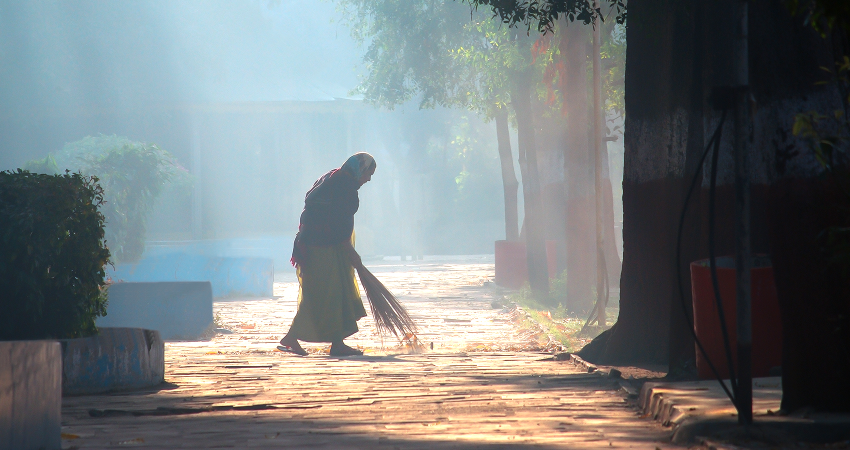
The Broom Broom Enterprise
Ever wondered how and where, one of the most essential cleaning equipment in all Indian households, the broomstick, is made? These were a few questions that intrigued me to discover an entrepreneurial potential in Meghalaya in the North-east of India. And at once I decided to travel to the picturesque state with vast expanse of broom grass plantations.
Where?
Meghalaya is home to a population of 2,306,069 inhabitants (census 2001) with about 5780 villages. The people in Meghalaya find their source of livelihood in agriculture and allied activities. The broom plant is a major forest-based resource for the farmers here and is distributed widely throughout the state of Meghalaya. It is commonly found on the hills, damp steep banks along ravines and on sandy banks of the rivers.
Set in a hilly landscape, Meghalaya is divided into 7 districts – East Khasi Hills, West Khasi Hills, East Garo Hills, West Garo Hills, South Garo Hills, Ri Bhoi, and Jaintia Hills. The biggest advantage for the farmers in Meghalaya is the cultivation of broom-grass which is easy and requires less financial investment.
How?
The broom grass can be grown even on marginal lands, wastelands and jhum fallow. Its cultivation can promote the sustainable use of fragile and degraded lands. It grows well on a wide range of soils varying from sandy loam to clay loam. The planting can be done by seeds or rhizomes. Some people also collect and transplant the wild seedlings for propagation. However, it is considered better to get quality seedlings from reputed nurseries.
The culms arise centrifugally during the peak growing season (April to July) and bear inflorescence (panicle) on shoot apex at the end of vegetative growth. The inflorescence that is about 30 to 90 cm long resembles a fox-tail and is used as broom. And this is sold as broomsticks!
Trade & retail
However, more than the botanical bit, what I really wanted to know was how the brooms ultimately reach its users. Do traders go to Meghalaya and buy it from farmers? What is the mechanism involved? How is the pricing done? With the rest of the economy, has this industry also grown by leaps and bounds? What is the life of people involved in this trade like? Is there an entrepreneurial spirit within them that constantly pushes them towards the better?
I got in touch with Bhaskar who runs ‘The Bhaskar Broom Company – Bamfoi’, about 50 km away from Guwahati. “Our Company collects brooms and takes them to Guwahati. There we sell them to the traders. After that it is those traders who supply it to the end users.” He also mentioned how the market for brooms is largely confined to northern India, mostly cities like Delhi, Mumbai and Kolkata.
Broom grass grown in the hills is made available to traders in a nursery at Karbi Anglong district of Assam, which are sent to Guwahati by small companies. Usually traders purchase the produce only between February-April. A bundle of 1 kilogram of broomsticks contains about 3-4 sticks and costs Rs.20-22. In the off season, the same is sold for Rs.30-40. To the small and marginalized farmers broom cultivation is an economic activity that sustains their seasonal livelihoods.
Marketing broom grass is easy since Meghalaya offers a vast linkage of all the villages to the wider regional or national market through their local market. In the months of December, January and February these local markets are flooded with broom sticks and the middlemen are the potential buyers. Earlier there used to be no fixed price and it was dependent completely on the price quoted by the middlemen. Now that the market has developed, a stronger framework is used.
“We take the grass from here and get them tied into brooms in Shillong. After that they go to households all over the country” says, a trader. Thus, value-addition of binding tufts of broomstick into an easily usable broom for sweeping floors and dusting ceilings, etc happens elsewhere.
Leading to national growth
Activities such as cultivation of broom grass on a large scale, if promoted not only help in regional development and providing employment but also contribute to the national growth on the whole. Although the cultivation of Thysanolaena maxima (broom grass) is largely unorganized, it grows in the wild on the hillsides, traders confidently make the sweeping statement that Meghalaya is easily the jharu capital of India. Agrees P.S. Nongbri, a Shillong-based forest officer who had prepared a report in 1995 on broomstick production and how it could be improved.
Mizoram Forest Produce Marketing Agency (MIFMA) purchases broomsticks at Vairengte on the Mizoram-Assam border are in turn sold to Shree Shyam Trading Company, New Delhi and the North East Regional Marketing Corporation, Govt. of India Enterprise, Guwahati.
According to MIFMA, Rs.3 crores have already been used to purchase these broomsticks and some families have received incomes of up to Rs.3 lakhs from their sales.
Apart from the MIFMA, the major change that took place happened after the Meghalaya Forest Department took these brooms to international trade fairs – a trade fair in Delhi in 1994 received an overwhelming response! Country-wide enquiries came along and by the following year, the price of a quintal of broom grass shot up from Rs.1,100-Rs.3,000. Even though the middlemen take a huge part of this revenue, they get about 60% of the price even which fetches the average household Rs.6,000-Rs.7,000 a year as additional income. The Meghalaya government decided to promote the plantation of broom grass in 1995. The scheme, from all accounts, has met with great success.
Efforts from NABARD
Even on the banking and finance front, there have been commendable efforts. For instance, The National Bank for Agriculture & Rural Development (NABARD), the Apex level National Bank in the field of Agriculture & Rural Development established on 12 July 1982 announced some favourable policy initiatives for the North-East India especially Mizoram.
It went one step further with its SHG (Self-help group) linkage programme which involves linking such groups to the formal banking system by sanctioning Rs.10.90 lakh to NGOs and banks for promotion and credit linking of more number of SHGs in the days to come. 9 Farmers Clubs have so far been formed and assisted with active participation of NGOs and bankers in the State. Further, grant assistance aggregating to Rs.8.81 lakh was provided to various NGOs for conduct of 15 Skill Development Programmes in various activities. These included broom processing and broom-making in addition to other trades like candle-making, tailoring, jam & pickle making, jute & handicraft, bamboo basket weaving, etc. These programmes have benefited 393 participants to provide self-employment.
The farmers of the North-east, the traders and the middlemen are part of an industry that poses a huge business opportunity. It continues to define the lives of a large segment of India, as they learn to recognize its benefits not only for themselves and their customers, but for the environment as well.

